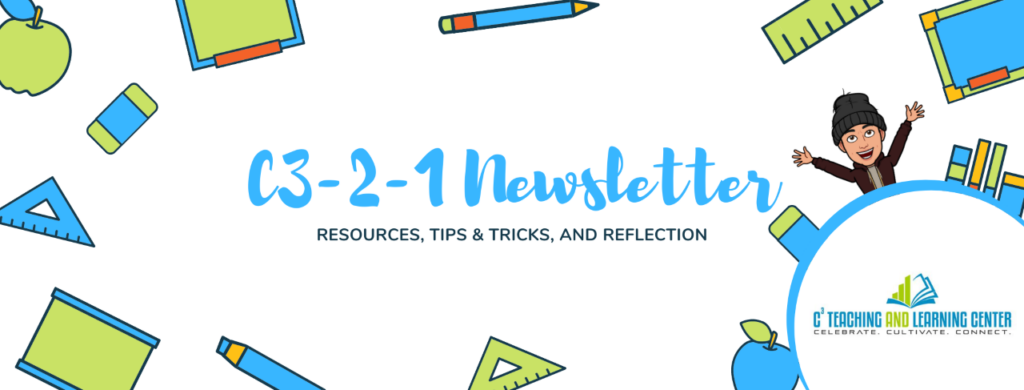C3-2-1 Newsletter – Fall 2021 Week Five!
Hello, Faculty Community!
Online teaching sucks, discussions about race can be productive, and critical thinking is still the goal. How is that for a hook?
These weekly newsletters feature 3 resources related to teaching and learning, 2 online tips and tricks, and 1 question for reflection.
Looking for archived resources, tips/tricks, and questions?
Revisit the past editions of the C3-2-1 Newsletter here.
Want to share?
If you have some resources, tips/tricks, and questions to share, please contribute to the newsletter using this C3-2-1 Form.

(3) Resources
1. Why Online Teaching Sucks (and what to do about it) by Lisa Lane
Why does grading suck? Why do essay assignments suck? Why do online discussion boards suck? Why does online teaching suck? Our very own, Lisa Lane (History), provides insight into why these things suck and what we can do about it. As someone practicing ungrading for the time this semester, I especially appreciate the article Why grading sucks, and what to do about it.
Quick read, quick wit, and hope for less suckiness
Thanks, Lisa!
2. Engaging in Productive Conversations About Race
Dr. Shaun Harper, the founder and executive director of USC’s Race and Equity Center, has released the resources, training material, and webinar recordings from the California Community Colleges Racial Equity Leadership Alliance series. You can take these lessons at your own pace. I will be sharing each one in the coming weeks, starting with the kickoff session – Engaging in Productive Conversations About Race
3. Making Connections That Matter: Critical Thinking In Theory and Practice
Ask any educator about the importance of critical thinking, and you will quickly find out it is a top priority for teachers. However, the definitions for and assessment of critical thinking are not issues that reach consensus. Laura Bellaera, a leading researcher on critical thinking, provides findings and suggestions that can help clarify our thinking on thinking.
(2) Online Tips and Tricks
I have been frustrated by thinking a quiz I created was exactly what I thought it was, only to find an error or missing element to the assessment. You can update published quizzes in Canvas, but please note – you may have to allow an extra attempt for students who have already started or finished their attempt.
2. Allowing Students To Create Discussions in Canvas
While you may be familiar with creating Discussions in Canvas, did you know that you can allow students to create their own threads? This function can be helpful when students are working collaboratively on a project, studying for a test together, or looking for a more informal space in Canvas to connect.
(1) Question
Do you need control? What happens when you let go?
Stay joyful,
Sean Davis
Joyful Teacher in Residence 🙂

